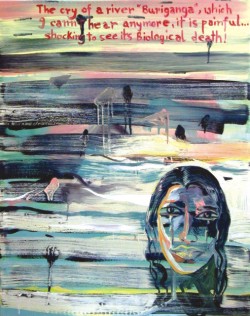|
Art
Alpana's Lament for Fast Fading Nature
Fayza Haq
 |
No comments!, Oil on canvas. |
Morsheda Arzoo Alpana had delighted art enthusiasts, when she exhibited her works at the Bengal Gallery, Dhanmandi , and earlier on at The Gallery, Banani. Her love and sympathy for her homeland in her more recent oil on canvas works seen presently at the Gallery of the Goethe Institute will also interest viewers. These large canvases with eye-catching colours reflect the artist's concern for her roots. The sharp contrast of hues and the bold strokes bring in the thought provoking vile environmental conditions in the flooded areas of Bangladesh during the cyclone Sidr of 2007. The pollution of the Buriganga River is also expressed in vivid images. Although the themes may not be original, considering they come from a Berlin-based artist it is something worth reckoning. Alpana hopes to carry this exhibition to East Europe, where she has been invited. Additionally for promoting exchange of ideas, Alpana has set up a studio at Dhaka. This is to establish a channel for sharing artists and their views between Berlin and Dhaka.
Flamboyant and outspoken, Alpana, in her installation of green painted brooms, stuck upright on mud; and the female deity painted in stark black at the back, presents importance of womanhood that sees all and tries to bring peace and harmony to the world at large. Like many female painters, Alpana too attempts to present the importance of women in society through the ages. Woman is a symbol of justice, says Alpana. Her earlier exhibits of haute couture at the Bengal Gallery also had women in mind.
"Women power ushers in what has been happening in Bangladesh for the last three decades," says Alpana. " I feel that no system is operating smoothly in the country of my origin. There are no clear thoughts or planning. If a step is taken forwards, two steps are taken backward, very often. The ordinary people are flummoxed and as I see it, the economy has not improved much over the years. This bothers me greatly. In the exhibition ' Drinking bottled water and breathing dust' I try to delineate the pathetic situation of my countrymen, who are confused at lack of water, electricity and gas countrywide. Pollution is the monster facing the bewildered countrymen, as is the case, in many other parts of the world," says Alpana.
"Blue river song", done in 2007, is a nostalgic piece, which presents the idylls of her student days, years back, when the Buriganga River had lyrical ambiance, with resting people in boats, surrounded with peaceful pink and gray waves. The suggestions of more boats in the backdrop and a gathering of gently moving clouds complete the image of harmony and contentment. "This is to bring into focus the fact that for decades together, chemicals, polythene and other reject items are being thrown into the Buriganga which is by the side of the capital city. 'What have those at the helm of affairs done', is the question. How long will it take to improve the atmosphere to a reasonable level? It is at the banks of the river where my teachers brought us to sketch, in my earlier, formative days. This is what I pine for the lost, gentle world of the past, " says Alpana. The purity of the past is what the painting draws attention to.
Her human figures, nude and semi-clad are flat. They usher in her eastern training and combine theme with the modern western trend to suggest rather than to depict in a photographic manner. At times they are not clear, as if she wants to protect their innermost feelings and emotions. When combined with the Royal Bengal Tiger, to present scenes of the Sunderbans with its tourists, feminine accessories with the very realistic, poised "cat" of the protected mangrove island. Strong lines and colours suggest suppressed passionate feelings. One finds Expressionistic flavours similar to all the other paintings. In this manner Alpana delineates her concern for man and nature.
 |
Morsheda Arzoo Alpana, Lost everything!, oil on canvas and No entrance. |
With matters proceeding as they are, for the past few decades, the world over, the artist cannot help but be almost hysterical with pessimism about the future. This is although the artist has all admiration for the survival instinct and the indomitable courage of the people of Bangladesh. Even when she depicts cyclones, she retains the beauty of nature. Large, luminous eyes, dancing, pink water lilies, and waving limbs of children and animals are included in her depiction of the 2007 cyclone. Depiction of houses and boats has also been included in sketchy forms. The juxtapositions of the green and brown lines are poetic and scintillating. The bar of muddy brown on top represents the vast expanse of emptiness that the cyclone victims had to face.
In one of the mind-whirling oil on canvases, Alpana has her own portrait with large, luminous eyes, curling and falling tresses. The background is semi-abstract with waves of water, containing large, dark drops of tears of despair. The tears of sorrow are those of the River Buriganga itself -- now full of stench and rejected filth of an industrialized lifestyle. This is in beige, flamingo pink, jet black and misty gray sweeps and curls.
Alpana's teacher in Santiniketan was K.G. Subrahmaniyam. In Berlin she studied under Helmut Otto and Karl Horst Hodicke.
Copyright
(R) thedailystar.net 2010
|

